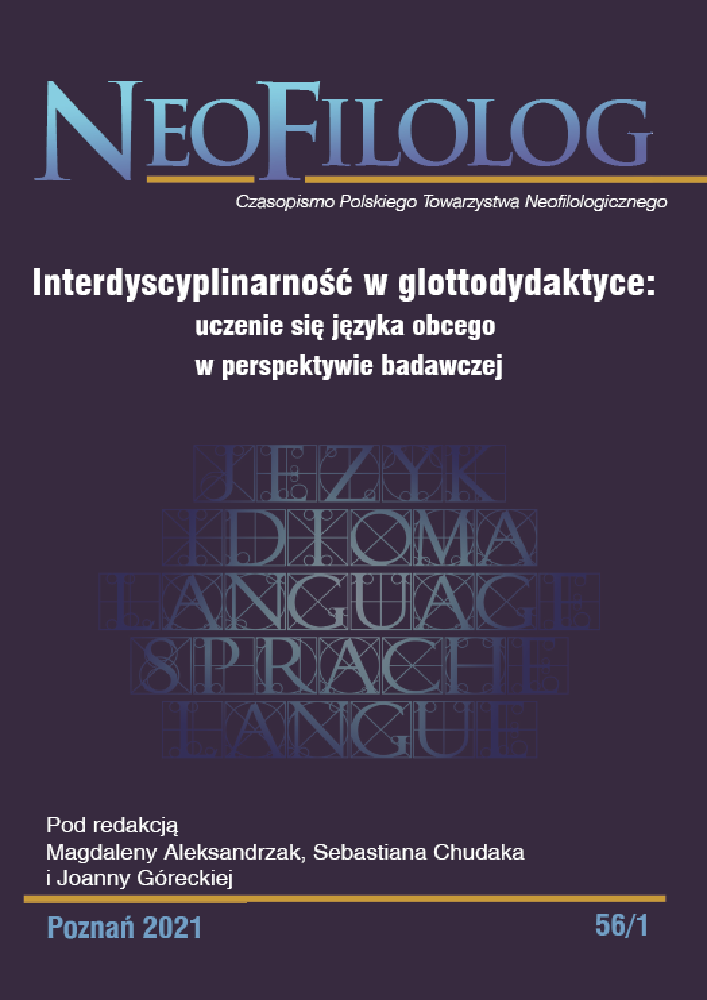Abstract
Feedback is one of the key tools used to regulate the process of learning. In order to be effective, it must provide the students with accurate information and guidelines concerning their work by not only showing them mistakes, but also pointing out what they already know and giving advice to help them improve their skills. Poorly executed feedback may damage the students’ motivation instead of reinforcing it. Thus, it is important to know how students perceive different feedback techniques and how they react to them. To answer these questions, we led a research among Polish bilingual high school students learning French. We asked them about their preferences concerning feedback and about its perceived influence on their motivation. The results show students prefer detailed comments which show them positive and negative aspects of their work, without harming their self-esteem, i.e. by giving feedback in front of their peers. Such practices, according to students, have a beneficial effect on their motivation.
Literaturhinweise
Allal L. (1991), Vers une pratique de l’évaluation formative. Bruxelles : De Boeck.
De Vecchi G. (2014), Évaluer sans dévaluer. Paris : Hachette.
Grangeat M. (2014), Connaître les principes de l’évaluation formative. Online : http://webcom.upmf-grenoble.fr/sciedu/evacodice [consulté 10/12/2019].
Guillemette F. (2004), Enseignement stratégique et autonomisation, (in :) Presseau A. (dir.), Intégrer l’enseignement stratégique dans sa classe. Montréal : La Chenelière, 141-162.
Łobocki M. (2009), Wprowadzenie do metodologii badań pedagogicznych. Kraków: Oficyna Wydawnicza „Impuls”.
Niemierko, B. (1997), Między oceną szkolną a dydaktyką : bliżej dydaktyki. Warszawa : WSiP.
Noiroux K., Simons G. (2016), La correction de l’expression écrite en langue étrangère et son exploitation pédagogique. « Recherches en didactique des langues et des cultures » 13 (3). Online : http://journals.openedition.org/rdlc/1302 [consulté 18/12/2019].
Wilczyńska W., Michońska-Stadnik A. (2010), Metodologia badań glottody-daktycznych. Kraków : Avalon.
Lizenz
Copyright (c) 2021 Neofilolog

Dieses Werk steht unter der Lizenz Creative Commons Namensnennung - Keine Bearbeitungen 4.0 International.
Autoren:
Die Autoren der zur Veröffentlichung in der Zeitschrift Neofilolog angenommenen Texte sind verpflichtet, den Vertrag über die Erteilung einer kostenlosen Lizenz für die Werke mit der Verpflichtung zur Erteilung einer Sublizenz CC auszufüllen, zu unterzeichnen und an die Adresse der Redaktion zurückzusenden.
Gemäß Vertrag erteilen die Autoren auf die in der Zeitschrift Neofilolog veröffentlichten Texte der Adam-Mickiewicz-Universität in Poznań eine nicht exklusive und kostenlose Lizenz und erlauben die Verwendung der Sublizenz Creative Commons Attribution-NoDerivatives 4.0 International (CC BY-ND 4.0).
Die Autoren behalten das Recht zur weiteren freien Verfügung über das Werk.
Benutzer:
Interessierte Onlinebenutzer dürfen die seit 2017 veröffentlichten Werke unter folgenden Bedingungen nutzen:
- Anerkennung der Urheberschaft - die Verpflichtung, zusammen mit dem verbreiteten Werk Informationen über die Urheberschaft, den Titel, die Quelle (Links zum Originalwerk, DOI) und die Lizenz selbst bereitzustellen;
- ohne Schaffung abgeleiteter Werke - das Werk muss in seiner ursprünglichen Form erhalten bleiben, ohne Zustimmung des Autors dürfen keine Studien, beispielsweise Übersetzungen, verbreitet werden.
Die Urheberrechte aller veröffentlichen Texte sind vorbehalten.
Sonstige:
Die Adam-Mickiewicz-Universität in Poznań behält das Recht auf die Zeitschrift als Gesamtheit (Layout, Grafik, Titel, Umschlagsprojekt, Logo usw.).
